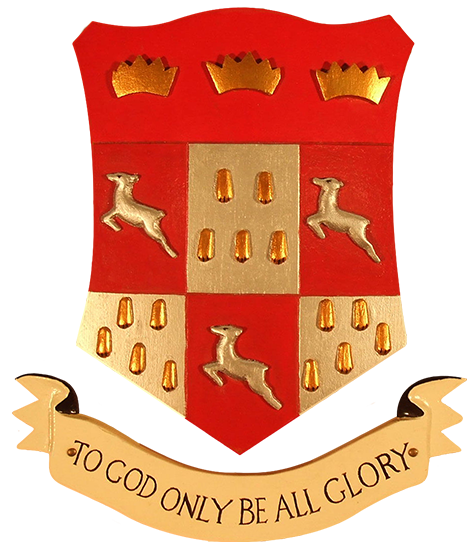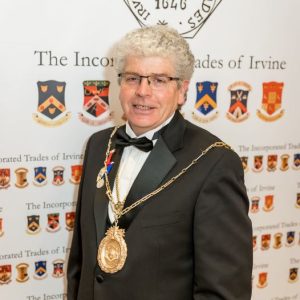Skinners Craft
Irvine's Skin Curers, Leather Tanners And Glove Makers
THE INCORPORATION OF SKINNERS IS MENTIONED IN THE SEAL OF CAUSE OF THE INCORPORATED TRADES OF IRVINE OF 1646. MEMBERSHIP OF THIS ANCIENT CRAFT WAS COMPRISED OF THOSE WHO WORKED IN SKINS, PELTS AND HIDES – THOSE WHO PREPARED THE RAW SKIN TO A STAGE WHERE THE HIDE COULD THEN BE FASHIONED.
For centuries, skins were indispensable for boots and clothing, shields, armour, tents, bottles and buckets. Leather was also used for the drive belts used to power the machinery of the Industrial Revolution.


Our Deacon
Placeholder
Placeholder
Further Information
The Incorporation of Skinners is mentioned in the Seal of Cause of the Incorporated Trades of Irvine of 1646. Membership of this ancient Craft was comprised of those who worked in skins, pelts and hides — those who prepared the raw skin to a stage where the hide could then be fashioned.
For centuries, skins were indispensable for boots and clothing, shields, armour, tents, bottles and buckets. Leather was also used for the drive belts used to power the machinery of the Industrial Revolution.
The Skinner Craft is an ancient craft indeed. The earliest mention of craftsmen in Scotland was at Doune, circa 1164, in a grant to the Abbot of Scone by King Malcolm ret. Skinners seem to have been long established in Ayrshire, being mentioned according to one local historian in the Kilmaurs Charter of 1527, which was granted by Cuthbert Cuninghame, 3rd Earl of Glencairn.
The membership of the Craft originally comprised of those who worked in skins, pelts and hides — those who prepared the raw skin to a stage where the hide could then be fashioned. They could then be made into all kinds of leather goods. As Irvine was a major port during the 17th century, there would be traders who dealt in all sorts of goods, including skins.
During the 17th century and on into the 18th, two important factors affected the Skinners. Firstly, Ayr became a major port, with a resulting shift in trade from Irvine. Secondly, Kilmarnock opened up as a major industrial town, where the manufacture of shoes was important. The records of the Incorporated Trades of both towns include Skinners. These two factors may well have seen the demise of the Skinner Craft in Irvine.
Bringing the history up to date, the Skinner Craft was reconstituted in 1920 by a group of enthusiasts wishing to see the Craft reincorporated within the Trades of Irvine. By this time the Incorporation had a more benevolent and charitable status, its exclusive privileges having been abolished in 1846.
It has nevertheless continued until the present day, sometimes enduring small numbers among the devotees. The Skinner Craft is particularly indebted in this regard to John D. Macgregor) who as Clerk from the late 1940s to the early 1970s kept the Skinners alive almost single-handedly at a time when there were few members and the wider Incorporation was in the doldrums.
The Skinner Craft once again enjoys full recognition within the Incorporation. It is a Craft which enjoys maintaining and paying homage to tradition. The Craft also seeks to take its place within the modern world through charitable fundraising activities.
The Craft has supplied ten Deacon Conveners since its reconstitution, including a proprietor of the town’s Eglinton Arms Hotel (Joe Caldwell)) an assistant general manager of the Bank of Scotland (Jim Wales), a senior international rugby administrator (Bill Nolan), and a quantity surveyor with Irvine Development Corporation. The last of these, Eric Park was in office during the Incorporation’s 350th anniversary celebrations in 1996. The current Clerk to the Incorporation, David Whitelaw, is also a member of the Craft.
For many years the Skinner Craft held its annual “Wee Pie” (AGM) at the Eglinton Arms Hotel. However, in the late 1980s a decision was taken to move this meeting. After that the Wee Pie was held in the Golf Hotel until the mid-2000s, when it was switched to the Ship Inn and latterly the more central Burns Tavern. Some of the functions the Skinners hold annually include the BBQ Games Night (with whisky tasting!) > and Skinners Away Day. This is an outing to Arran during the course of which a golf tournament takes place. The Craft has also been known to make cultural visits to places the Deacon’s Court think may interest the craftsmen.
Membership of the Craft now encompasses all walks of life. The diversity of the membership today is in sharp contrast to the single focus of the original Craft.
Based on an earlier article by EX-Deacon Taylor Brown

